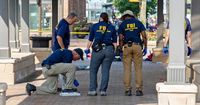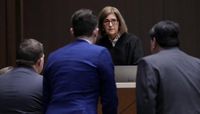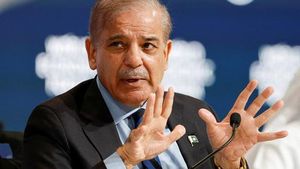Robert Crimo III, the man responsible for the tragic mass shooting during a Fourth of July parade in Highland Park, Illinois in 2022, was sentenced to life in prison without the possibility of parole on April 24, 2025. This sentence was handed down by Lake County Judge Victoria A. Rossetti, who described Crimo as "irretrievably depraved, permanently incorrigible, and beyond rehabilitation." Crimo, 24, received seven consecutive life sentences, one for each of the victims he murdered, along with an additional 50 years for each of the 48 counts of attempted murder.
The sentencing hearing, which began on April 23, 2025, concluded with emotional testimonies from survivors and the families of the victims. Judge Rossetti expressed that the court had "absolutely no words" to adequately capture the horror and pain inflicted on that fateful day. The incident not only claimed seven lives but also left nearly 50 others injured, creating a ripple effect of trauma throughout the community.
Crimo did not attend the court proceedings, opting to remain absent even as survivors and relatives faced the reality of their losses. His refusal to confront the aftermath of his actions was highlighted by Lake County State's Attorney Eric Rinehart, who remarked, "It is clear that he was unable to confront what he had done." Survivors like Liz Turnipseed, who was shot in the pelvis during the attack, expressed relief that the trial was over, stating, "I don’t have to think about him anymore, I don’t have to worry about him anymore." This sentiment was echoed by others who attended the hearing.
The attack occurred on July 4, 2022, when Crimo opened fire from a rooftop, unleashing more than 80 rounds on the unsuspecting crowd below. Among the victims were Katherine Goldstein, 64; Jacquelyn Sundheim, 63; Stephen Straus, 88; Nicolas Toledo-Zaragoza, 78; Eduardo Uvaldo, 69; and married couple Kevin and Irina McCarthy, both 37. Their deaths left families shattered and a community grappling with the aftermath of such senseless violence.
During the sentencing, Judge Rossetti noted Crimo's complete disregard for human life, stating, "He intended to end the happiness he saw around him." This was further emphasized by Rinehart, who described the impact of the shooting as leaving "oceans of pain, trauma, grief, and loss" in its wake. The emotional testimonies from survivors painted a vivid picture of the chaos that ensued on that day, with many recounting their harrowing experiences of fleeing for their lives.
In the months leading up to the shooting, Crimo had exhibited troubling behavior, including previous encounters with law enforcement. In 2019, police had been called to his home after reports of threats he made, and they confiscated knives from him. Despite these warning signs, Crimo was able to legally purchase the weapon used in the shooting, a fact that has sparked renewed discussions about gun control and the responsibilities of gun owners.
Following the shooting, Illinois enacted a statewide assault weapons ban, and advocates have called for a national ban on similar firearms. Highland Park Mayor Nancy Rotering emphasized the need for continued efforts to prevent such tragedies, stating that "no community should ever have to endure this kind of devastation." The shooting also led to a groundbreaking prosecution of Crimo's father, Robert Crimo Jr., who faced charges for his role in helping his son obtain a gun license. He pled guilty to misdemeanor counts of reckless conduct and received a sentence of 60 days in jail.
As the community continues to heal, the memories of the victims remain alive in the hearts of those who knew and loved them. The impact of the shooting extends far beyond the immediate loss of life, affecting families and friends who will forever carry the weight of that day. Survivors like Ashbey Beasley, who was present at the parade with her son, have become advocates for stricter gun laws, hoping to prevent future tragedies.
Crimo's actions on that day not only resulted in the loss of life but also highlighted the urgent need for reform in how gun ownership is regulated, particularly for individuals with a history of mental health issues or violent behavior. As the legal proceedings come to a close, the community of Highland Park remains vigilant in its fight for justice and the safety of its citizens.
In the wake of the sentencing, many survivors expressed a desire to move forward, yet the scars of that day will remain. As Highland Park continues to grapple with the aftermath of the shooting, the hope is that the lessons learned will lead to meaningful change in legislation and a renewed commitment to preventing gun violence in all its forms.






